Panchakarma Treatment
Panchakarma treatment following the classical method (As per ancient treatises)
We are highly regarded as the best ayurvedic center in Kerala for delivering authentic panchakarma treatments in Kerala. We utilize both ancient and modern techniques to provide the finest Ayurvedic therapies available. Five major procedures to eliminate toxins from the nearest orifice are popularly called Panchakarma. Panchakarma treatment includes a set of five therapeutic treatments administered to the patient for the deeper and complete detoxification of the body. The presence of toxins which is accumulated, in the physical, pranic, and mental dimensions from past life accumulations, from the parents, society, improper diet, improper lifestyle, and living without awareness causes not fulfilling the purpose of creation in this universe. According to Ayurveda, detoxification is essential before undergoing any other major treatment. Even for healthy people, it is recommended to undergo this treatment once every 5 years to get rid of all the chemical toxins accumulated over the years. In some cases, Panchakarma treatment alone can use to treat many chronic diseases that will not require any further treatments afterward.
Procedures included in Panchakarma treatment
Purvakarma (Preparatory procedures before Panchakarma – detoxification treatment)
- Deepana – Pachana chikitsa
- Snehana
- Swedana
Pradhanakarma (Main procedure included in Panchakarma – detoxification treatments)
Panchakarma treatment – 5 types of purification treatments
- Vamana
- Virechana
- Asthapana Vashti
- Anuvasana vasti
- Nasya
Paschat Karma ( Post procedures done after Panchakarma – detoxification treatments)
- Samsarjanakrama ( Special diet )
- Drugs
- Regimens
Note :
Acharya sushrutha mentioned Asthapana vasti and Anuvasana vasti under the heading of Vasti. He included Rakta mokshana (bloodletting) as the 5th purification treatment in Panchakarma (detoxification treatments). Raktha mokshana is a procedure of removing the vitiated blood, in diseases caused by rakta and pitta. This therapy will be done only in accordance with the patient’s condition.
Receiving authentic Panchakarma – detoxification treatments as per the classical way, requires 90-120 days. Each and every procedure will be monitored. By observing samyak lakshanas (the symptoms of proper saturation) then only the next treatment will be started.
The different phases of panchakarma – detoxification treatments.
Purvakarma ( Preparatory procedure )
Before the actual Panchakarma – detoxification begins, there is a need to prepare the body with prescribed methods to encourage dislodging toxins from deeper levels.
Deepana pachana chikitsa
Agni (digestive fire ) is the most important parameter to be considered before starting panchakarma – detoxification treatments. Without a proper functional state of digestive fire, snehapana (oleation) does not give the desired results. It can lead to complications.
- Deepana Pachana treatments enhance the Agni ( Digestive fire )
- Ama pachana ( Clears the metabolic toxins )
Thus it helps in better digestion and absorption. It reduces the risk of complications.
- Snehana (Oleation therapy)
Snehana is the immediate treatment after Deepana – Pachana. It can be done internally and externally.
Snehapana is the oral intake of medicated or non-medicated fat in required quantities. It helps to saturate the toxins before doing Vamana (Therapeutic vomiting) and virechana (Therapeutic purgation). It requires 3-7 days according to the state of vitiation of doshas and the individual’s constitution.
Abhyanga is an external oil massage. After observing the proper signs of saturation of snehapana, Abhyanga should be done prior to Vamana and Virechana.
- Swedana (Sudation Therapy)
The process of inducing sweat through various procedures is known as swedana. Baspa sweda (Steam) is usually given before panchakarma.
Swedana helps to mobilize the saturated toxins and then move from different parts of the body to the middle part of the body.
Abhyanga and swedana (Steam) are the preparatory procedure of all the panchakarma – detoxification treatments. Based on the panchakarma (detoxification) procedure both are giving the whole body or local parts.
Pradhana Karma (Panchakarma-detoxification)
- Vamana – Therapeutic Vomiting
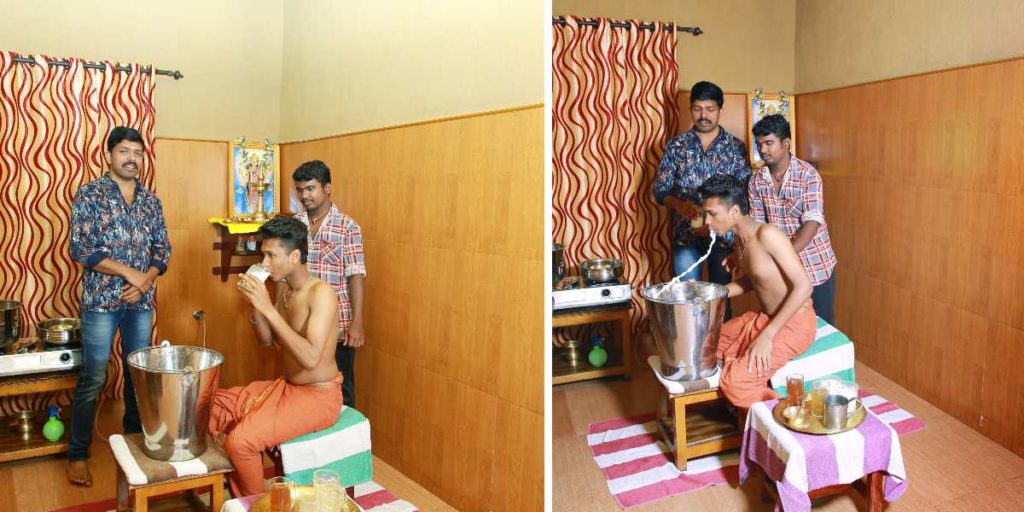
Vamana is the process of cleansing the upper part of the body (Stomach, Lungs, etc..) through the oral route by inducing vomiting. It helps to balance Kapha dosha.
2. Virechana -Therapeutic purgation
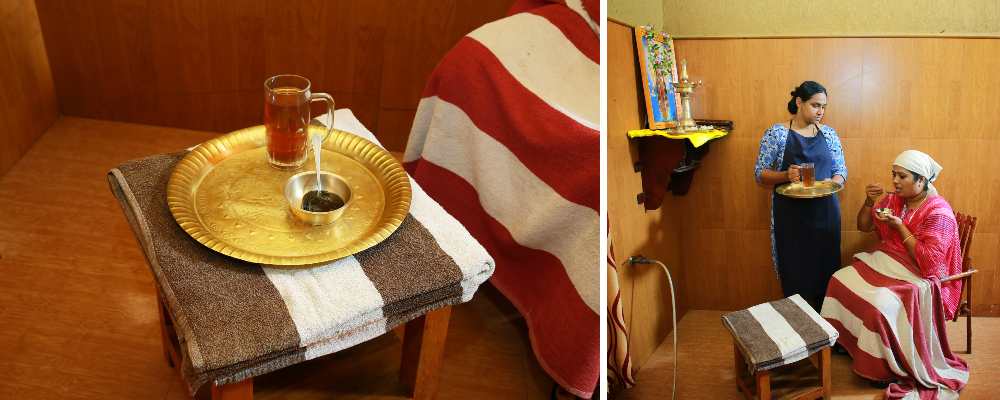
Virechana is the process of evacuation of accumulated doshas in the lower gastrointestinal tract through the anal route. It removes pitta dosha from the body. It completely cleanses the gastrointestinal tract.
3. Asthapana Vasti – Herbal decoction enema
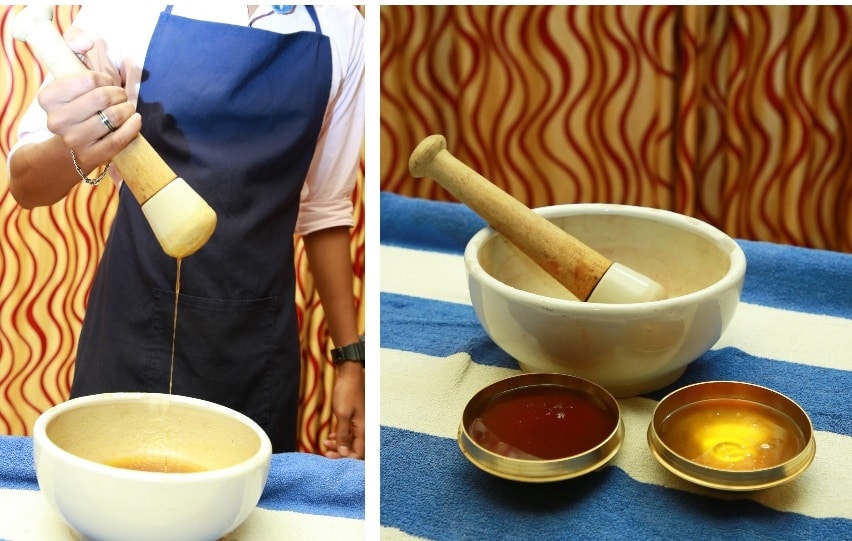
The administration of Vasti predominantly consisting of herbal decoction through the rectal route is known as Asthapana Vasti. It includes herbal decoction, medicated oil, honey, rock salt, herbal powder, etc. It is also known by the name Niruha vasti.
4 .Anuvasana Vasti- Medicated oil Enema
Administration of medicated oil or fat through the rectal route in a prescribed dose.
Both (Asthapana vasti and Anuvasana vasti) vasti help to subside the vata dosha in our body. Vata dosha is predominant in the colon. It cleanses the colon.

Asthapana vasti and Anuvasana vasti can be given individually or in a combined procedure.
Uttara vasti is another type of vasti which is the administration of medicine through the urethral route in both sexes. It is effective in conditions like male sexual dysfunction, male and female infertility, tubal block, and in genito – urinary diseases.
5. Nasya – Nasal Therapy
It is the nasal administration of medicine in the form of medicated oil or herbal juice extract or herbal powder or herbal smoke.
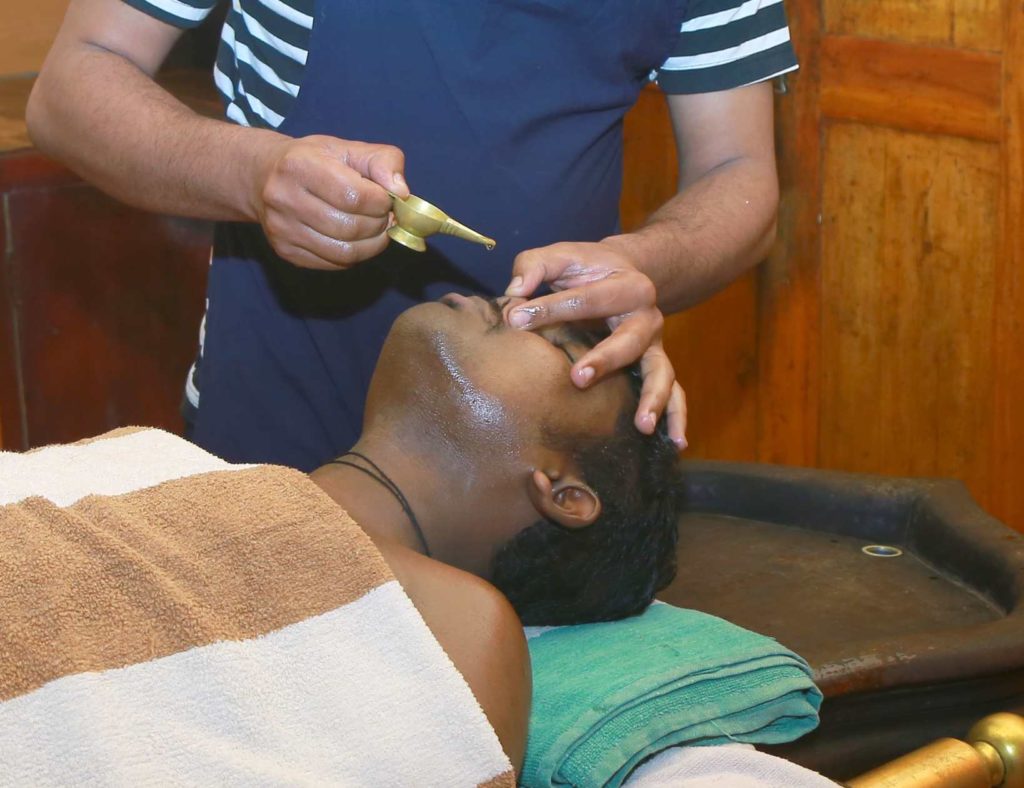
The nose is the doorway to the brain. Administration of medicine through the nose cleanses the accumulated Kapha from the head and neck.
PASCHAT KARMA (Post procedures after Panchakarma – detoxification treatments)
Samsarjanakrama
After Vamana and Virechana, jatharagni (Digestive fire) gets diminished. Samsarjanakrama is performed to augment this diminished Agni (Digestive fire).
When all the Agni (digestive fire) remains in a normal state, then there is normal production of all dhatus (Tissue elements) and respective malas (waste products).
Categorization of days in the Panchakarma – detoxification procedure
| Sl: No | Treatments | No: of Days | Procedure |
| 1 | Deepana Pachana Chikitsa (For improving digestive fire and for eliminating metabolic toxins) | It will be continued till the proper symptoms are present. | External treatments and Internal medications |
| 2 | Snehapana (Oleation therapy) | 3-7 days (Depends on the symptoms of saturation). | Intake of medicated Ghee, No other treatments and Medications |
| 3 | Resting Day | 1 day | Diet, Abhyanga (Oil massage) and Bashpa Sweda (Steam). |
| 4 | Vamana karma (Therapeutic vomiting) | 1 Day | 3-7 days (Depending on the symptoms of saturation). |
| 5 | Samsarjanakrama (Post dietic regimen) | 7 Days | Diet, external therapies, Internal medications |
| 6 | Snehapana (Second course of oleation) | 3 – 7 Days | Intake of medicated Ghee, No other treatments and Medications |
| 7 | Resting Days | 2 – 3 Days | Diet, Abhyanga (Oil massage) and Bashpa Sweda (Steam). |
| 8 | Virechana Karma (Therapeutic purgation) | 1 Day | Abhyanga (Oil massage), Bashpa Sweda (Steam), and therapeutic purgation. |
| 9 | Samsarjanakrama (Post dietic regimen) | 7 Days | Diet, external therapies, internal medications |
| 10 | Vasti Karma (Therapeutic enema) (Asthapana Vasti – decoction enema or Anuvasana Vasti – Oil enema or combined) | 8 Days | Along with Enema, Internal Medicines, and Other External Therapies |
| 11 | Resting Days | 16 Days | Along with Nasal Therapy, Internal Medicines, and External Therapies |
| 12 | Nasya Karma (Major administration of medicine) | Till the proper symptoms of Nasya. | Abhyanga (Oil massage), Bashpa Sweda (Steam) and therapeutic vomiting |
Note:-
If the patient is having 90-120 days time duration for treatment, then the only authentic classical way of panchakarma – detoxification treatments will be possible. Otherwise, if you have a lesser duration of treatments, on the basis of assessment, the required cleansing treatments among the panchakarma (detoxification) will be provided.
Along with the main Panchakarma – detoxification procedures different external therapies are included according to the individual condition. This includes local treatments and also whole-body treatments.
External therapies (From the below-mentioned treatments, on the basis of the individual’s condition, procedures will be selected)
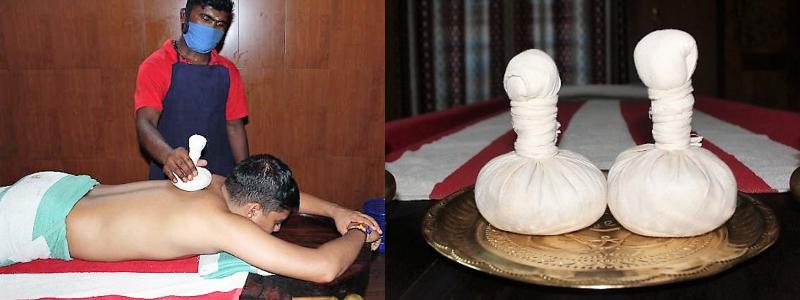
-
Abhyanga :- Oil massage
-
Udwartana :- Powder massage
-
Dhara :- Pouring medicated liquids all over the body.
-
-
Kashaya dhara:- Pouring medicated decoction.
-
Dhanyamla Gomutra dhara:- Pouring fermented cereals with Cow’s Urine.
-
Ksheera dhara:- Pouring medicated milk.
-
Gomutra dhara:- Pouring cow’s Urine.
-
Takra dhara:- Pouring medicated butter milk.
-
Thaila dhara:- Pouring medicated oil.
-
-
Kizhi (Pinda sweda):- Sudation done by using heated packs.
-
-
Shashtikashali pinda sweda (Njavara kizhi):- Pack of special cooked rice with medicated milk.
-
Jambeera pinda sweda :- Pack of lemon.
-
Mamsa pinda sweda :- Pack of meat.
-
Valuka sweda :- Pack of Sand.
-
Dhanya pinda sweda :- Pack of cereals, horse gram, black gram etc..
-
Choorna pinda sweda :- Pack of herbal powder.
-
-
Avagaha :- Immersing the body in herbal decoction or medicated oil.
All the above treatment can be done locally or whole body.
-
Bashpa Sweda (Steam treatment):- Patient made to sit in a steam chamber.
-
Nadi sweda :- Sudation done by passing steam over the body parts by using a tube attached to a kettle.
-
Shiro dhara :- Medicated oil, herbal decoction, medicated milk, medicated butter milk etc.. continuously pour on the forehead.
-
Shiro pichu :- Cotton soaked with suitable oil and placed on the head.
-
Shiro Vasti :- Pool of medicated oil is allowed to stay over the head for a prescribed time.
-
Shiro lepa (Thala pothichil):- Paste application over the head.
-
Lepam :- Herbal paste application.
-
Mukha lepam :- Face pack.
-
Upanaha :- Paste application with bandaging.
-
Kati Vasti :- Pool of luke warm oil is allowed to stay over the lower back.
-
Janu Vasti :- Pool of luke warm oil is allowed to stay over the knee joint.
-
Greeva Vasti :- Pool of luke warm oil is allowed to stay over the cervical region.
-
Uro vasti :- Pool of luke warm oil is allowed to stay over the cardiac region.
-
Dhoopanam :- Nasal fumigation.
-
Karna Dhoopanam :- Ear fumigation.
-
Netra Tarpanam :- Pool of medicated ghee is allowed to stay over the eyes.
-
Karnapooranam :- Droping the medicated oil into the ears.
-
Netra prakshalanam :- Eye wash with medicated liquid.
-
Karna prakshalanam :- Ear wash with medicated liquid.
-
Yoni Prakshalanam :- Vaginal wash with medicated liquid.
-
Kavalam :- Holding medicated oil or herbal decoction in the buccal cavity followed by gargling for a certain period.
-
Gandoosha :- Holding medicated oil or herbal decoction in the buccal cavity for a certain period.
-
Bidalaka :- Herbal paste is to be applied over the eyelid.
-
Pindi :- Massage around the eyes with a very small medicated pack.
-
Ashchyotana :- Pouring medicated drops into the eyes.
-
Anjanam :- Medicine in the form of powder, paste or liquid is to be applied inside the lower lid of the eyes.
-
Pudapaka :- Maintain the prescribe juice of medicinal plants for specific time.
-
Varti Prayogam :- Suppositories.
PANCHAKARMA FAQ’S
- What is the science behind Panchakarma?
The science behind Panchakarma lies in its understanding of the body’s unique constitution and the three doshas: Vata, Pitta, and Kapha. These doshas govern our physical and mental well-being, and when they become imbalanced, it leads to illness.
So, the underlying principle of Panchakarma is to eliminate accumulated toxins from the body and restore the body by balancing the doshas.
- Is panchakarma only about detox?
No, Panchakarma offers a comprehensive approach to detoxification as well as healing. It is a therapeutic process that aims to remove toxins and balance doshas, it helps to upgrade one’s metabolism, helps to boost immunity, and increases one’s energy level by resetting the body.
- Is it necessary to do ghee therapy before Panchakarma treatment?
Ghee therapy is a pre-purificatory therapy that involves preparing the body for panchakarma treatment. It helps by loosening the toxins which the body easily eliminates during panchakarma treatment.
So, panchakarma can be done with or without ghee therapy, depending upon the toxins accumulated in the body and by understanding the energy levels of the person.
- Is it necessary to do all Panchakarma procedures?
No, it’s not always necessary to undergo all 5 panchakarma procedures. It varies a lot and depends on the Ayurvedic constitutional type, the individual’s doshic imbalances, age, digestive strength, and immune strength.
Depending on the needs, all or only parts of the 5 therapies are utilized.
Sometimes 2 or 3 of the therapies are sufficient to bring the overall outcome.
- How many days are required for panchakarma treatment?
Panchakarma treatment can range from a few days to several weeks, depending on the individual’s needs and goals.
A span of a minimum of 21-28 days is required for a normal healthy person.
In case of intensive cleansing 2 months is required to detoxify and heal.
- How long does it take to see the results of panchakarma treatment?
The results of panchakarma treatment may vary depending on the individual’s needs and goals.
Some individuals may see immediate results, while others may experience gradual improvements over time.
- Which is the best season for Panchakarma?
According to Ayurveda, the Monsoon season is considered to be one of the best times to undergo detoxification. The pores of the skin open up because of the high humidity which results in the better absorption of the medicines.
- How does a person prepare for Panchakarma treatment?
Panchakarma treatment is recommended to follow a light and easy-to-digest diet, avoid caffeine, alcohol, and processed foods and get plenty of rest and hydration.
- Can panchakarma treatment be done for mental health conditions?
Panchakarma treatment can be helpful for individuals with mental health conditions. The treatment involved in panchakarma can help to calm the mind and relax the body. This can lead to a reduction in levels of cortisol and other stress hormones, which can have a positive impact on mental health.
- Are there any side effects while doing Panchakarma?
No, but some individuals may experience mild side effects such as fatigue, headaches, or body aches during or after Panchakarma. These symptoms are usually temporary and will subside as the body detoxifies and rebalances.
- Can panchakarma be done at home?
Panchakarma should be done under the guidance of a trained and qualified Ayurvedic practitioner in a specialized center or clinic.
So, it is not recommended to try panchakarma at home without proper guidance.
- Can pregnant women undergo panchakarma?
Pregnant women should not undergo panchakarma as it may cause harm to the developing foetus.
DAILY SCHEDULE
The following schedule has been designed for receiving the optimum benefit at physical, pranic, and mental levels.
- Every day morning wakes up around 4.30 am.
- When awake, practice seven rounds of deep breathing.
- Slowly sit on the bed and focus your mind on positive thoughts.
- Then get up and do brushing and tongue cleaning.
- Do oil pulling using sesame oil, for eliminating lodged toxins from the oral cavity.
- Drink warm water.
- Take shower.
- Wear washed and clean cloth.
- Yoga Session – 5.00 am – 6.15 am
- Morning Pooja(Agnihotram) – 6.30 am – 7.30 am
- Breakfast – 8.00 am – 9.00 am
- Treatment session – (Mentioned in our Notice board -Restaurant.)
- Consultation time – (Mentioned in our Notice board-Restaurant.)
- Yoga Nidra Session – 12.00 pm – 01:00 pm
- Lunchtime – 01.00 pm – 1.30 pm
- Kalari session – 11.00 am – 12.00 noon , 3.00 pm – 4.00 pm
- Evening Yoga – 4.00 Pm – 5.15 Pm
- Anna Pooja – 5.15 Pm – 5.30 Pm
- Dinner session – 5.30 pm – 6.00 pm
- Evening pooja & chanting – 6.00 pm – 7.00 pm
- Bhajans – 6.30 pm (Every Monday & Friday)
- Every Friday at 05:15 am Lalitha Sahasranama yajna will be conducted ( No regular morning yoga on Friday)
- No Yoga Nidra on Sunday
Reasons for the absence must be brought to the notice of your respective teacher and doctor immediately.
INSTRUCTIONS FOR MAKING YOUR STAY EFFECTIVE
❖ The diet and lifestyle are planned by our doctors in accordance with classical Ayurvedic methods.
❖ Do not take tea or coffee while taking treatments, as it reduces the effect of internal medicines.
❖ Diet is very important like, Yoga and treatment. So please maintain silence while taking food.
❖ During treatment time, avoid using lots of exposure to sound, wind, overstraining in front of the computer, irrelevant talking, and daytime sleep. If you face any difficulties mention it to your doctor while coming for a consultation.
❖ Take permission from the concerned Physician before making traveling during the treatment Phase, as traveling may result in adverse effects.
❖ If there is any emergency during the stay please contact
Reception: +91 9539684635
Restaurant : +91 9656901643
Reservation : +91 8157011347
AYV Doctors Team
Weekly programs:
1) Organic vegetable farm and Cattle farm visit: Every Monday and Tuesday at 2.45 PM
2) Pharmacy visit: Every Wednesday at 7:30 AM
3) Musical meditation sessions (BAJAN) every Monday and Friday at 6:30 PM
Some changes will be made in the daily schedule by the doctor according to the phase of Panchakarma – detoxification treatments.


